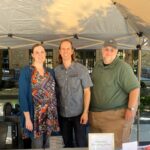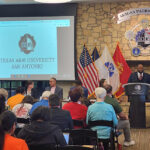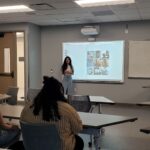And that’s exactly what poetry students wanted to find out when they met in the cafeteria at 12:30 p.m. Feb. 14 to conduct their own poetry flash mob.
The students, enrolled in English Professor Ann Bliss’s ENGL 3360/5370 courses, spread out at different tables in the middle of the dining area at Main Campus Building and read a poem aloud, no explanation given.
The reading selection was diverse, from 19th century poetry to contemporary poetry. A few brave students even decided to read from their own work.
“The question in class that came up was: ‘What would happen if we took poetry out of the classroom?’” Bliss said.
Some of the class members’ nervousness was heard in their voice as they read aloud; others memorized their lines so that they were able to visually interact with the onlookers.
“At first I was nervous, but once I started reading, I just became focused on the poem,” English major Belinda Garcia said.
Despite the hesitance, the class used teamwork to finish their experiment until the very end.
“We used each other’s energy,” psychology major Natalie Crabtree said.
So, what about the students who had no idea why poetry was being read aloud in the middle of the cafeteria?
When asked about the student’s reaction in an interview before the experiment was conducted, Bliss said, “I think [the students] will be very confused. I’m hoping they won’t get annoyed. I really hope they’ll listen and ask us what we’re doing.”
She added, “I’m hoping there will even be an audience.”
The idea came up in Bliss’ poetry class after she stumbled across a link on Facebook that piqued her interest, leading her to read an article titled “Pearls Before Breakfast.”
The article, which was featured in The Washington Post in April 2007, describes a social experiment starring world-renowned violinist Joshua Bell.
For the experiment, Bell stood against a wall in a busy D.C. subway station, playing a number of classical pieces using his 18th century violin, worth $3.5 million.
Of the 1,097 people that passed through the L’Enfent Plaza Station, hardly anyone stopped to even acknowledge the live music and only one individual recognized the famous violinist.
After playing for 43 minutes, Bell, whose concert tickets sell for a minimum of $100 per seat, had collected a total of $32.17 from the passersby.
So, what exactly was the point in the event?
Well, the experiment was not done to find out how many people would recognize Bell. Nor was it done to see how much money he could make. Instead, The Washington Post wanted to find out whether or not people would stop and forget their rushed routine to simply appreciate their confrontation with beauty in a commonplace environment.
After reading the article, Bliss became inspired by the idea that people, caught in the rush and routine of their everyday lives, do in fact distance themselves from the concept of beauty.
When she approached the subject with the students of her poetry course, Bliss prompted a discussion which led the class to an idea for their own social experiment — a poetry flash mob.
With all the new art work on campus and the music that invades our everyday lives, the class devised an innovative plan to present pieces of a different, unexpected form of art.
Though there wasn’t nearly as much people present as in the Joshua Bell experiment, there was definitely an audience — a scattered crowd of unassuming students. Some people looked around in confusion, their thoughts interrupted by the words.
Some people acted as if they didn’t hear a thing, their eyes refusing to leave the lines in their open textbooks. Others listened intently, smiling at certain words that were said.
There was one student who stopped ordering food mid-sentence so that she could hear the presentation. A few people carried on with their conversations, ignoring the presenters altogether.
“At first I was confused because all of a sudden there was a lot of people in the cafeteria, and it’s usually pretty empty,” criminology senior Virginia Olvera said.
Education major Marty Lewin was one of the students who seemed to pay no attention to the poetry class as he studied from a textbook.
But although Lewin may not have been looking at the presenters, he said he was definitely listening. One of the poems even caught his attention and “stuck to [his] heart,” he said.
“It’s nice that they are bringing poetry to people who don’t experience it everyday,” Lewin said.
Bliss said she was scared the students in the cafeteria were going to carelessly chatter over the presentations, drowning out the voices of those who were reading. She was pleasantly surprised to observe that when the poetic recitation began, the cafeteria “got very quiet, very quickly.”
While the overall response was positive, one class member recalls overhearing an individual that was complaining about the interruption.
But the poetry students were prepared for all types of responses, because that was their mission in the experiment — to see whether students would be willing to fit a bit of inconvenient beauty into their time-pressed lunch break.
However, the beautiful aspect of poetry isn’t always found in the subject of the poem, but rather in the experience.
“Not all of it is beautiful. Some of it is painful. But the poetry should evoke some kind of emotion,” Bliss said.
The beauty that transcends in poetry, like other forms of art, is its ability to take people out of their conventional ways of thinking and out of the hustle-and-bustle of their everyday lives. It allows them to leave their world of practical affairs if only for a moment, and to enter a deeper realm that verbalizes the unspoken, that explains the indescribable, that speaks on emotion and experience, whether it is good or bad.
So next time something beautiful stumbles along your routine path, such as a formal poetry reading in the near future, take a moment to question what’s truly meaningful, and simply appreciate the experience for what it is.






